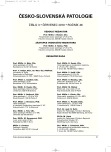-
Medical journals
- Career
Autosomal Dominant Polycystic Kidney Disease in the Fetus with Seemingly Negative Family History. A Case Report
Authors: Marta Ježová 1; Š. Prášilová 2
Authors‘ workplace: Ústav patologie, Lékařská fakulta Masarykovy Univerzity a Fakultní nemocnice, Brno, 2Oddělení lékařské genetiky, Fakultní nemocnice, Brno 1
Published in: Čes.-slov. Patol., 46, 2010, No. 3, p. 68-71
Category:
Overview
An unusual case of fetal polycystic kidney disease is reported. Oligohydramnios and enlarged hyperechogenic kidneys were found at 21 weeks. The pregnancy was terminated and fetal autopsy performed. The histopathological pattern of fetal kidneys was consistent with glomerulocystic disease and this raised suspicion of autosomal dominant polycystic kidney disease (ADPKD). Initially, the family history seemed to be negative for ADPKD. The mother’s diagnosis was established only after the abortion of the affected fetus. She had no symptoms of renal disease. Multigenerational involvement was revealed on the mother@s side. Mechanisms leading to prenatal ADPKD and prognosis of the pediatric patients are discussed.
Key words:
autosomal dominant polycystic kidney disease – polycystic kidney disease – ADPKD – gene PKD1 – prenatal diagnosis – fetal autopsy
Sources
1. Bernstein, J.: Glomerulocystic kidney disease-nosological considerations. Pediatr. Nephrol., 7, 1993, s. 464–470.
2. Bisceglia, M., Galliani, C.A., Senger, C. et al.: Renal cystic diseases. A review. Adv. Anat. Pathol., 13, 2006, s. 26–56.
3. Blyth, H., Ockenden, B.G.: Polycystic disease of kidneys and liver presenting in childhood. J. Med. Genet., 8, 1971, s. 257–284.
4. Boyer, O., Gagnadoux, M.-F., Charbit, M. et al.: Prognosis of autosomal dominant polycystic kidney disease diagnosed in utero or at birth. Pediatr. Nephrol., 22, 2007, s. 380–388.
5. Brun, M., Maugey-Laulom, B., Eurin, D. et al.: Prenatal sonographic patterns in autosomal dominant polycystic kidney disease: a multicenter study. Ultrasound Obstet. Gynecol., 24, 2004, s. 55–61.
6. Fick, G.M., Johnson, A. M., Strain, J. D. et al.: Characteristic of very early onset autosomal dominant polycystic kidney disease. J. Am. Soc. Nephrol., 3, 1993, s. 1863–1870.
7. Kapras, J., Štekrová, J., Židovská, J. et al.: Autosomálně dominantně dědičná polycystická choroba ledvin. Čas. Lék. čes., 134, 1995, s. 521–523.
8. Kapras, J., Štekrová, J., Židovská, J. et al.: Problémy DNA diagnostiky v rodinách s autosomálně dominantně dědičnou polycystickou chorobou ledvin. Vnitřní Lék., 39, 1993, s. 942–945.
9. Keeling, J.: Fetal and Neonatal Pathology, 3rd ed., London: Springer-Verlag, 2001, s.535-538.
10. MacDermot, K. D., Saggar-Malik, A.K., Economides, D. L. et al.: Prenatal diagnosis of autosomal dominant polycystic kidney disease (PKD1) presenting in utero and prognosis for very early onset disease. J. Med. Genet., 35, 1998, s. 13–16.
11. Shamshirsaz, A., Bekheirnia,R. M., Kamgar, M. et al.: Autosomal-dominant polycystic kidney disease in infancy and childhood: progression and outcome. Kidney International, 68, 2005, s. 2218–2224.
12. Tee, J. B., Accot. P. D., McLellan H. et al.: Phenotypic heterogeneity in pediatric autosomal dominant polycystic kidney disease at first presentation: a single-center, 20-year review. Am. J. Kidney Dis. 43, 2004, s. 296–303.
13. Zerres, K., Rudnik-Schoneborn, S., Deget, F.: Childhood onset autosomal dominant polycystic kidney disease in sibs: clinical picture and recurrence risk. J. Med. Genet., 30, 1993, s. 583–586.
14. Židovská, J., Merta, M., Kapras, J.: Postoje členů rodin s polycystickou chorobou ledvin k onemocnění a presymptomatickým testům. Čas. Lék. čes., 133, 1994, s. 184–187.
Labels
Anatomical pathology Forensic medical examiner Toxicology
Article was published inCzecho-Slovak Pathology

2010 Issue 3-
All articles in this issue
- Ovarian Carcinoma: Current Diagnostic Principles
- False Negative PAP test? Cytopathologist as a Member of Expert Group in Case of Late Diagnosis of Cervical Cancer
- Autoimmune Pancreatitis with Biliary Tree and Liver Involvement as a Part of IgG4-related Autoimmune Sclerosing Disease. Case Report
- Autosomal Dominant Polycystic Kidney Disease in the Fetus with Seemingly Negative Family History. A Case Report
- Nerve Sheath Myxoma with Bidirectional Schwannomatous and Perineural Differentiation
- Czecho-Slovak Pathology
- Journal archive
- Current issue
- Online only
- About the journal
Most read in this issue- Ovarian Carcinoma: Current Diagnostic Principles
- Autosomal Dominant Polycystic Kidney Disease in the Fetus with Seemingly Negative Family History. A Case Report
- Autoimmune Pancreatitis with Biliary Tree and Liver Involvement as a Part of IgG4-related Autoimmune Sclerosing Disease. Case Report
- False Negative PAP test? Cytopathologist as a Member of Expert Group in Case of Late Diagnosis of Cervical Cancer
Login#ADS_BOTTOM_SCRIPTS#Forgotten passwordEnter the email address that you registered with. We will send you instructions on how to set a new password.
- Career

